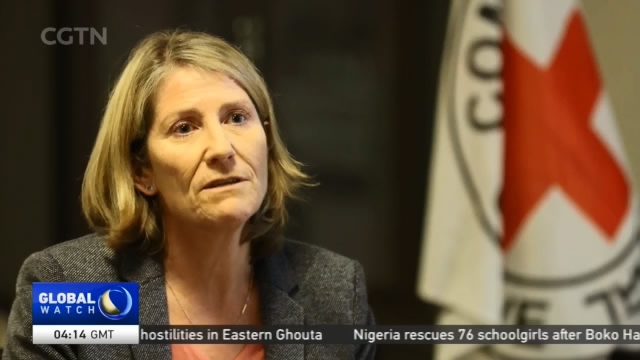
13:15, 22-Feb-2018
Iraq Reconstruction: Interview with ICRC head in Iraq

Since the start of the Mosul offensive, the International Committee of the Red Cross has provided food, clean water and essential relief items to over 130 thousand people. Established in 1863, the ICRC is dedicated to protecting the lives and dignity of victims of armed conflict and other situations of violence. CGTN's reporter Meng Qingsheng sat down with Ms. Katharina Ritz, the ICRC's head of delegation in Iraq, and discussed pressing issues facing the country's reconstruction.
MENG QINGSHENG "The ICRC Iraq Delegation has been actively involved in humanitarian work across Iraq since the 1980s. What does the work generally involve?"
KATHARINA RITZ, HEAD ICRC DELEGATION, IRAQ "Basically, we came to Iraq in the 1980s, the major focus of our work was visiting the prisoners of war, which was in relation to the Iran-Iraq conflict at that time. Afterwards, it has evolved, we were studying to more and more during the period of sanctions, where we had a very big water and sanitation department and had often been involved in reconstruction maintenance, and hospitals where the treatment plans. Every cycle of conflict has obvious impact on the country, where we have increased the activities of assisting directly people with place, with food, and material, also we had a surgical team in a hospital to treat the wounded from the conflict. When I was here the first time, we have just to move our delegation around, we have to be exiled because we came under attack. We were not able to work in close proximity with the neighborhood. Today we have managed to deploy 11 offices in Iraq, and we can practically go everywhere and also give a little bit idea that some normalcy has come back to Iraq and many other places."
MENG QINGSHENG Iraq has now started a reconstruction process after decades of conflicts. Based on your professional experiences, what challenges lie ahead?"
KATHARINA RITZ, HEAD ICRC DELEGATION, IRAQ "The reconstruction is obvious the most important aspects of the post-conflict phase. On the other hand, what is important for us, it doesn't go from emergency directly to reconstruction, where there are a lot of humanitarian consequences which are very much linked to the conflict. It can be the detainees and can also be the missing family members, also people who are displaced but can not return home because the homes are destroyed. And we will need to adopt a sustainable approach so that we can help the individuals some sustainable livelihood activities, which is accompanying the whole reconstruction phase."

SITEMAP
Copyright © 2018 CGTN. Beijing ICP prepared NO.16065310-3
Copyright © 2018 CGTN. Beijing ICP prepared NO.16065310-3